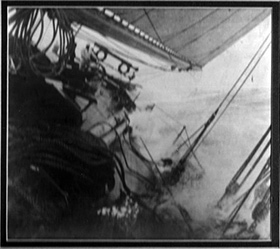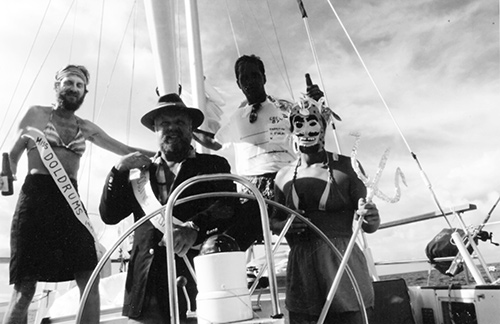![]()
CHAPTER 22
By midnight, Endymion rolled and slapped sails on a windless slate-gray sea with the helm almost impossible to control. It wasn’t dangerous, just annoying, hot, sticky, and miserable.
Sailors call this wallowing in the doldrums ‘doing doughnuts.’ At least frequent rainsqualls provided fragmentary relief. And for joy—regardless the battery problem, we fired up both engine and icemaker. Hurrah! Cold drinks on the Equator, nothing sounded better.
We lived on deck. Endymion’s sweltering, stagnant air below invited seasickness. Tension-free blocks banging on deck magnified the bedlam below.
In the cockpit, sweat-drenched Kyle leaned across the combo backgammon/coffee table.
“Hey Tony, remember you told me about your dad’s class with Capt. Swede, where he said you can always feel the wind by moving your head in a circle—if your eyes are wide open?”
“Yeah . . . what about it?”
A smirk appeared and Kyle plunged forward. “You said there is always air movement and your eyes feel it first because they are so sensitive. Right?”
“Yeah—something like that, and it tells the direction of the wind,” Tony added, happy he had remembered and delighted to add the wind direction tidbit.
“Well, here’s what I think,” said Kyle, slowly turning to expose his eyeballs to the faintest of drafts. “It’s got nothing to do with eyes, but you got horrible B.O., Tony and it’s stinkin’ me out across the cockpit.” “Stick your nose up my ass then, and see if dem eyes can tell you where this fart starts,” Tony replied.
I joined Jim for the 0200 watch, once more fascinated by the billions of stars in the sky, many of which were already dead, still beaming light across space to enchant us. I also kept an eye on a half-moon that rose slowly from an ink-black mass of clouds building on the distant horizon. We shut down the Perkins to welcome silence and ghosted along on whispers of a new gentle warm breeze. There’s something special about those first moments when blocks tighten and sails fill with early cat’s paws of a new wind. Mantovani’s “To Amadeus with Love” drifted from the deck speakers. I felt intensely close that moment, to my dad, whose spirit I felt beside me in the cockpit. I pictured Grandpa, aboard the original Endymion years ago with wind and sea the same as for me this night.
I have another treasured 1905 photo of Grandpa on deck with his helmsman, one hand gripping the rigging on a windy day. He’s wearing a gentleman’s suit, as successful men did in those days. I have Grandpa’s stem-winder watch on a fob with a medal engraved providing details of the Kaiser Cup race. It hangs on a bulkhead right below me in the salon of my Endymion. Those moments reminded me of a poem I have slightly modified from an unknown author:
Today, I love the wind as it blows
Across the Pacific, stretching for land.
Today I love the warmth of the sun
As I love the touch of Denise’s hand.
Today I love the smell of the sea,
The rush of waves rolling under me.
The sea, the wind, birds and sky,
I want them all and I know just why.
Today I’m touched by all of God’s things
That cover the sea or grow on the land.
I’m happy today. I’m in God’s hand.

Deck scene Grandpa’s Endymion. Circa 1905
Much as God and I have been having an awesome affair out here, He sadly was not pushing us to the crossing. The wall of rising black clouds dissolved and another day passed with temps over 100 cooling to 90 degrees beyond sunset. The bunk sheets were damp straight through—and stank! Even the foam rubber mattress emitted an offensive fragrance. The dull, tiresome routine had us on edge. The wind came—and died. We fired the engine up—and shut it down. But we were harvesting ice cubes, heaps of them!
Equatorial doldrums can be cruel. In dead calm seas with crushing humidity, rainsqualls skirted us, some only feet away. Swimming was out. Lurking sharks and fear of the unknown kept our bravery in check. We were close to the Equator—“E” as we called it. Chef Kyle had prepared a one-pot pasta so fiery we had to eat it with bananas to stave off its bowel-numbing potency. As we thanked Kyle with gestures, the wind suddenly piped to 25 knots, blowing directly from “E.” All night we made only 27 nm forward progress. We were close though and in revenge, Kyle shouted “There it is!” and, like dopes, we all looked.
Combining sextant skills with dead reckoning we figured at 1659, on our 12th day at sea we entered the Southern Hemisphere. King Neptune presided with dignity over our small group, advancing us from our lowly pollywog status to shellbacks by anointing each with a few drops of red wine. Straight to the lips it went. We toasted by clicking paper cups laced with a fermented Amazon concoction that struck a narrow margin between our getting drunk or going blind. Our official crossing was at 00.00’00 north and 127.32’20 west, essentially the middle of the pond.
And we had a contest winner! Kyle, the cheerful kid with a big smile and outstanding work ethic had narrowly won the spinnaker completion. His 9.2 nautical miles in a one-hour run beat the Amazon’s 9.1. Kyle showed no humility accepting his $40.00 prize money.

Crossing the Equator—L-R-Jim, Skip, Kyle & the Amazon. Tony took picture.
We had not seen another vessel since the freighter many days ago, confirming my belief mid-ocean is one of the safest places to sail. There is nothing to hit.
My adrenalin was pumping that night. I couldn’t sleep so I took Tony’s 2200 watch. He didn’t care. I slipped into heavy weather gear and harness because the weather looked dismal. No moon, no stars, and sticky as usual. As soon as Tony went below, hard tropical rain—the most forceful of the trip—hit suddenly. Wind velocity leapt from 7 to 30 knots in moments. It was manageable so I saw no point in disturbing the others.
Between rain drilling my eyes like pellets and the wind, I could hardly see the instruments, or that defining line between sea and sky we often refer to romantically as the horizon. The fickle wind shifted 60 degrees, from southeast to southwest, making it challenging to maintain sail trim to keep on course. The waves were again confused and choppy with significant white water. At one point the horizon simply disappeared. I could see only black from the deck to heaven, with flashes of now-breaking waves moving in pandemonium. Alone on deck, I became disoriented. I couldn’t line the compass up with the swinging wind guide. I was certain the white smear of waves were going in the wrong direction. I labored mentally to pull everything together, but couldn’t. Not knowing and without bearings I headed off the wind instead of into it, straining to find the horizon, my heart pumping and eyes crying for relief from the salty spray; a wave caught us on the quarter, throwing me awkwardly and painfully into the leeward rail.
Damn—that hurt, I thought, knowing I’d have bruises, but making me conscious everything was working from my brain to harness, carefully clipped to a through hull fitting beside the cockpit.
It was over in ten minutes, and no other crew had come topside for a look-see. It’s amazing, I thought, how much punishment we can absorb and adjust to—how we live in a different rhythm, where it takes legions of resolve to stay alert and focus for weeks at a time.
My stamina, in fact all of our stamina, had been tested by breakage, doldrums, storms, and tense moments. I wondered, what would Denise, my friends, and family be doing at this moment? Are they sleeping, at work, stuck at a stoplight, or walking the dog? Would they understand this life—comprehend these situations?
Sunday, April 26th, we broke free of the remaining doldrums. An easterly 15–20 knot wind was perfect. Up went the bitch (spinnaker) and up went our speed. Tony’s log entry read, “Freight train . . . Yea!” That night our minds were blown again by a breathtaking assortment of shooting stars. They were everywhere. For over an hour, set against the blackness of night at sea, hundreds of shooting stars cascaded to earth rendering me again speechless and thanking God for the privilege of witnessing his universe in action.
We were 700 nm from Nuka Hiva and had sailed 2405 nm since departing Mexico when Jim, in better spirits, added the words “Rapid Transit” to his log entry.
Later that day I took sick, even way out beyond everything, sailing where there are no germs or viruses. My symptoms of fever, headache, nausea, and chills indicated flu. I slept for two semi-delirious days, awakening to wonder how single-handed sailors cope with such problems?
I recovered with a new respect for the comprehensive medical kit Denise had gifted to us back in Newport Beach, and though he wasn’t licensed, I began teaching Tony to use the ham radio.
On April 28th, the subdued Amazon blurted, “I would kill for a Good Humor toasted almond ice cream.”
Rain pestered us, mostly quick squalls like the one that threw me into the lifelines a few nights back. Ordinarily, we could see them coming—small storms filling only a portion of horizon and packing a punch for only a few minutes. Worse than rain was the dampness below deck and resulting unwelcome smells likely emanating from strange cultures.
Tony hovered over the charts for a good bit on this day, boasting with brimming bravado, “We will be at anchor in Hiva Oa by 1630 on May 1st—a Pacific crossing in 19 days, not too shabby for this granola bowl collection of nuts and fruit characters.”
He could be close. We had been working Endymion hard. That’s part of the game. The faster we cross, the less our exposure to the whimsy of the sea.
The color of the ocean had changed to a lavish aquamarine, and the whitecaps whipped up by the steady, less humid wind had become pure white. Following seas had been building and averaged 10 to 12 feet, making them a blast to surf the yacht on. We had averaged 8.6 knots the past 24 hours with the high riding ‘bitch’ making surfing possible. It was outrageously fun to be on the wheel, feel a big wave come from behind, lift Endymion’s stern, and with intensity, fling the entire yacht forward into the trough, until another wave picked us up and started it all over again. I’ll never get enough of it.
Also different were the flying fish in the Southern Hemisphere, a larger species, more blue in color and, being cheeky perhaps, more intelligent than their northern cousins, because they didn’t land as frequently on the boat.
“Strange,” Kyle commented, “I have never seen one of these critters along the West Coast. Lots of them out here though, so whadda we call em, roaches of the sea?”